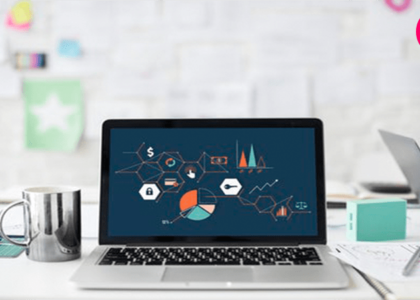Artificial intelligence (AI) has been transforming various industries, and software development is no exception. Integrating AI into the software development lifecycle (SDLC) is bringing about unprecedented changes in how developers build, test, and deploy applications.
Additionally, AI is improving efficiency, enabling more sophisticated solutions, and significantly reducing human error. This article discusses the impact of AI on software development. We will examine how AI reshapes coding practices, automates testing processes, enhances security, and fosters innovation.
1. AI-Assisted Coding
One of the most significant impacts of AI on software development is in the area of coding itself. Traditionally, coding requires manual input and a deep understanding of programming languages. AI is changing that by offering intelligent code completion, generation, and even full code automation.
Tools like GitHub Copilot and TabNine use natural language processing (NLP) and machine learning to provide developers with smart code suggestions. These tools analyze large datasets of code to predict and recommend code snippets, functions, or even entire algorithms.
For example, GitHub Copilot can suggest Python functions based on the comments that developers write. This feature speeds up coding and can help less experienced developers overcome complex challenges.
What are the Benefits of AI-Assisted Coding?
Some of the benefits of exploring AI-assisted coding include:
Increased Productivity
AI tools help developers streamline repetitive tasks like writing boilerplate code and reduce the time spent on mundane activities. They assist with code generation and even help overcome coding “writer’s block.”
Consequently, software developers can focus more on complex problem-solving and creative tasks, leading to faster development cycles and overall productivity gains.
Error Reduction
AI tools can analyze code for syntax and semantic errors, catching potential bugs early and suggesting fixes. This not only helps maintain cleaner code but also reduces the time spent on debugging. Developers are also more efficient when using AI for real-time code review and correction during development.
Faster Learning Curve
AI-assisted coding tools, such as code completion and debugging tools, provide new developers with contextual guidance and code examples, helping them learn faster by providing immediate feedback and suggestions. This accelerates their ability to contribute to projects and build skills without requiring constant human intervention.
2. Unit and Regression Testing
Testing is a critical part of software development, ensuring that the product functions as expected without bugs or vulnerabilities. However, manual testing can be time-consuming and prone to human error. AI-powered testing tools are automating this process, improving accuracy, and speeding up the release cycles.
AI can analyze the behavior of previous test cases and predict which ones are most relevant for new features or bug fixes. This allows for smarter, more targeted testing rather than exhaustive tests that may not yield valuable insights.
AI testing frameworks can automatically write new test cases, simulate user interactions, and identify edge cases that humans might miss.
Top Benefits of Using AI in Automated Testing
If you are unsure of whether to switch to AI for unit and regression testing, here are some potential benefits to guide your decision:
Faster Test Execution
AI-driven tools significantly speed up test cycles by automating tasks like test case generation and test execution. This can greatly reduce testing time, allowing developers to receive feedback quickly and fix issues faster than with manual testing.
AI also ensures test cases are executed efficiently based on changes in the code, reducing unnecessary tests and optimizing the process.
Continuous Integration/Continuous Deployment (CI/CD)
AI enhances CI/CD pipelines by automating repetitive testing tasks. It enables continuous testing throughout the development process, ensuring that code is tested more frequently and with fewer errors. This automation leads to faster releases with higher quality while providing early feedback to developers, which helps catch bugs earlier in the cycle.
Reduced Costs
Automating testing with AI not only reduces the need for large testing teams but also shortens the time to market. The reliability and accuracy of AI-driven tools cut down on human errors and manual work, allowing teams to focus on exploratory testing. Over time, this efficiency drives down operational costs while improving the overall quality of the software.

3. AI and Bug Fixing
Identifying and fixing bugs can be one of the most frustrating parts of software development. AI is helping to mitigate this by automatically identifying bugs and even suggesting solutions.
Tools like DeepCode and Snyk use machine learning to scan codebases and identify potential vulnerabilities or bugs. DeepCode, for example, analyzes millions of lines of code and compares them with existing solutions to suggest potential fixes.
AI systems can learn from past coding mistakes, identifying patterns that lead to bugs and notifying developers before the code is deployed.
Impact on Software Development
Debugging with AI has several implications for the development process including:
Proactive Debugging
AI tools enable mobile app developers to detect bugs early in the development process, leading to more efficient and proactive debugging. With machine learning algorithms, potential issues can be flagged before they escalate, minimizing the need for extensive debugging in later stages.
Higher Code Quality
AI-driven tools such as GitHub Copilot assist in generating cleaner, more reliable code by automating error detection and suggesting best practices. This not only improves code quality but also ensures that software products are more stable and secure.
Improved Developer Experience
AI reduces the burden of repetitive tasks like code refactoring and testing, allowing developers to focus on more innovative aspects of their projects. By automating these mundane tasks, AI enhances the overall developer experience, helping them be more productive and creative.
4. AI in Security and Threat Detection
As software systems become more complex, ensuring their security has become a significant challenge. AI is playing a crucial role in improving cybersecurity by identifying vulnerabilities, detecting anomalies, and mitigating potential threats in real time.
AI-driven platforms like Darktrace and Symantec use machine learning algorithms to detect unusual patterns or behavior in applications and infrastructure. For instance, these systems can monitor network traffic, access logs, and user behavior to identify potential security breaches or attacks. When an anomaly is detected, AI can automatically take steps to isolate and mitigate the threat.
Key Benefits of Using AI in Cybersecurity
Automated response systems: AI automates incident response, enabling organizations to react swiftly to potential threats. By reducing human error and speeding up response times, AI-powered systems contain threats more effectively, ensuring that breaches are mitigated before they can cause significant damage.
User behavior analysis: AI monitors and analyzes user activity, detecting anomalies that could indicate insider threats or unauthorized access. This proactive defense strengthens security measures by identifying unusual behavior patterns in real-time.
AI-powered breach detection systems: These systems analyze network traffic and user behavior to detect and respond to security breaches as they occur. They can catch threats that might be missed by traditional methods, significantly reducing the risk of successful attacks.
Enhanced phishing detection: AI-powered systems can identify phishing attempts by analyzing email patterns and sender behavior. These systems continuously evolve to detect even the most sophisticated phishing techniques, protecting organizations from potential breaches and financial losses.
5. AI and DevOps
AI is enhancing DevOps practices by automating various parts of the software delivery pipeline, optimizing resource management, and improving collaboration across teams. For instance, using AI in CI/CD pipelines and predictive analytics in DevOps have revolutionized the development process.
Continuous integration and continuous deployment (CI/CD) are critical aspects of modern software development. AI helps automate many of the processes involved, such as code integration, testing, and deployment. AI-driven tools can predict potential issues in the pipeline and suggest optimizations, reducing downtime and deployment failures.
AI can also analyze data from past projects to predict future resource requirements, potential bottlenecks, and even optimal deployment times. This ensures that development teams can work more efficiently and deliver software faster.
6. Enhanced User Experience (UX) with AI
AI is revolutionizing the way software is designed, especially in terms of user experience (UX). By analyzing user behavior and feedback, AI can help developers create more intuitive, user-friendly applications.
AI can personalize software interfaces based on user preferences and behaviors. For instance, e-commerce platforms use AI to tailor recommendations for individual users based on their browsing and purchase history. In the development of software, AI can predict how users will interact with an interface and suggest design changes to enhance usability.
In addition, tools like Google Analytics and Hotjar offer insights into how users interact with a software product. AI can take this data a step further by predicting user frustration points or suggesting features that would improve overall satisfaction.
Final Thoughts
The integration of AI into software development is no longer a futuristic concept—it’s a reality that’s here to stay. From automating tedious coding tasks to enhancing security and optimizing user experiences, AI is drastically transforming how software is created and maintained.
Looking ahead, AI will likely play an even more prominent role in software development, enabling developers to build more complex and innovative applications at unprecedented speeds. As machine learning algorithms and AI models continue to evolve, we can expect to see further improvements in areas like code quality, project management, and user satisfaction.
For software developers, embracing AI-powered tools and techniques is becoming essential not just for staying competitive but for pushing the boundaries of what’s possible in the world of software development.





